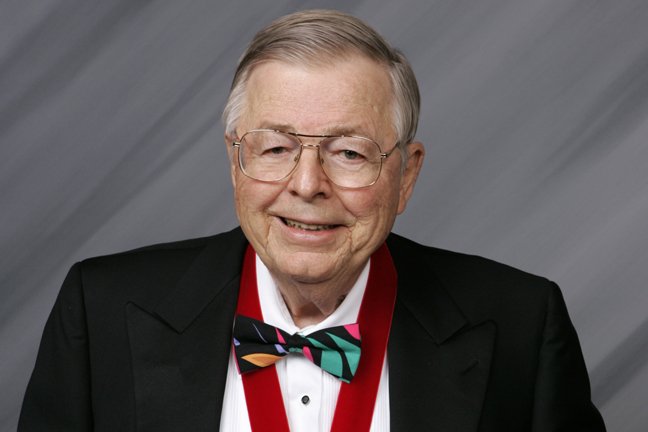In Memoriam: Earl Bakken

University of Minnesota electrical engineering alumnus and Medtronic founder dies at 94
MINNEAPOLIS / ST. PAUL (10/22/2018) — University of Minnesota College of Science and Engineering alumnus and Medtronic founder Earl E. Bakken, died on Oct. 21 at his home in Hawaii. He was 94.
Bakken grew up in Columbia Heights, Minn., and was fascinated with the movie Frankenstein. For Bakken, the movie “inspired me to bring people back to life with electricity,” he often said.
Over the course of his career, Bakken worked closely with University of Minnesota scientists, engineers, and health care providers. He received his undergraduate degree in electrical engineering from the University of Minnesota in 1948, and the next year founded Medtronic Inc. Today, Medtronic is the world’s largest medical device company, with 86,000 full-time employees around the world and a market capitalization of more than $129 billion. He led the company for 40 years.
Among Bakken’s many significant innovations was his work with University of Minnesota heart surgeon C. Walton Lillehei, M.D., Ph.D., to create the first battery-operated, wearable pacemaker. Ironically, Bakken may have achieved an even more personal understanding of the importance of his life’s work toward the end of his life. Bakken had several implanted medical devices himself, including stents, insulin pumps, and a Medtronic pacemaker.
In addition to his work at Medtronic, Bakken also founded the Bakken Museum, a Smithsonian-affiliate that offers dynamic exhibit experiences and industry-leading STEM-focused education programs. In 1981, Bakken received an Outstanding Achievement Award from the University of Minnesota, the highest award given to alumni. In 1990, he was elected to the National Academy of Engineering. He also received honorary degrees from several universities, including an M.D. Honorary Causa from the University of Minnesota Medical School in 2007.
In 2017, two University of Minnesota centers were named in his honor—the Earl E. Bakken Medical Devices Center and the Earl E. Bakken Center for Spirituality & Healing. Both interdisciplinary centers break the mold in exploring new ideas and fostering innovation.
The Earl E. Bakken Medical Devices Center is an interdisciplinary program under the Institute for Engineering in Medicine that combines research, education and training focused on medical devices. The center has successfully supported researchers through the process of moving devices from concept to market. It also works to train and support the next generation of innovators who will go on to change health care with further discoveries, following the model initiated by Bakken.
“The Medical Devices Center wouldn’t have been possible without the foundation Earl Bakken built in Minnesota,” said Arthur Erdman, Ph.D., director of the Earl E. Bakken Medical Devices Center. “Having his name officially associated with our center is an honor, and we are committed to continuing to live up to his charge, to create new technologies to improve health.”
Bakken had a unique appreciation for both the art and science of health care, as demonstrated by his long-standing support for the University’s Center for Spirituality & Healing, a center focused on research, outreach and education of integrative health and wellbeing. The center launched the nation's first master’s degree in health coaching, conducts pioneering NIH-funded research, consults with health care systems on care model innovation and supports corporate and community-based organizations advancing health and wellbeing programming.
Bakken was an early mentor for the Center for Spirituality & Healing founder and director, Mary Jo Kreitzer, Ph.D., R.N., and was a strong advocate for integrative approaches to health and healing.
“Mr. Bakken was one of our most illustrious and accomplished alumni, and his work has a continuing impact on millions of people daily around the world,” Kreitzer said. “He inspired us to think bigger, to try to fulfill the immense potential we have to improve the health and wellbeing of people and communities around the world.”
